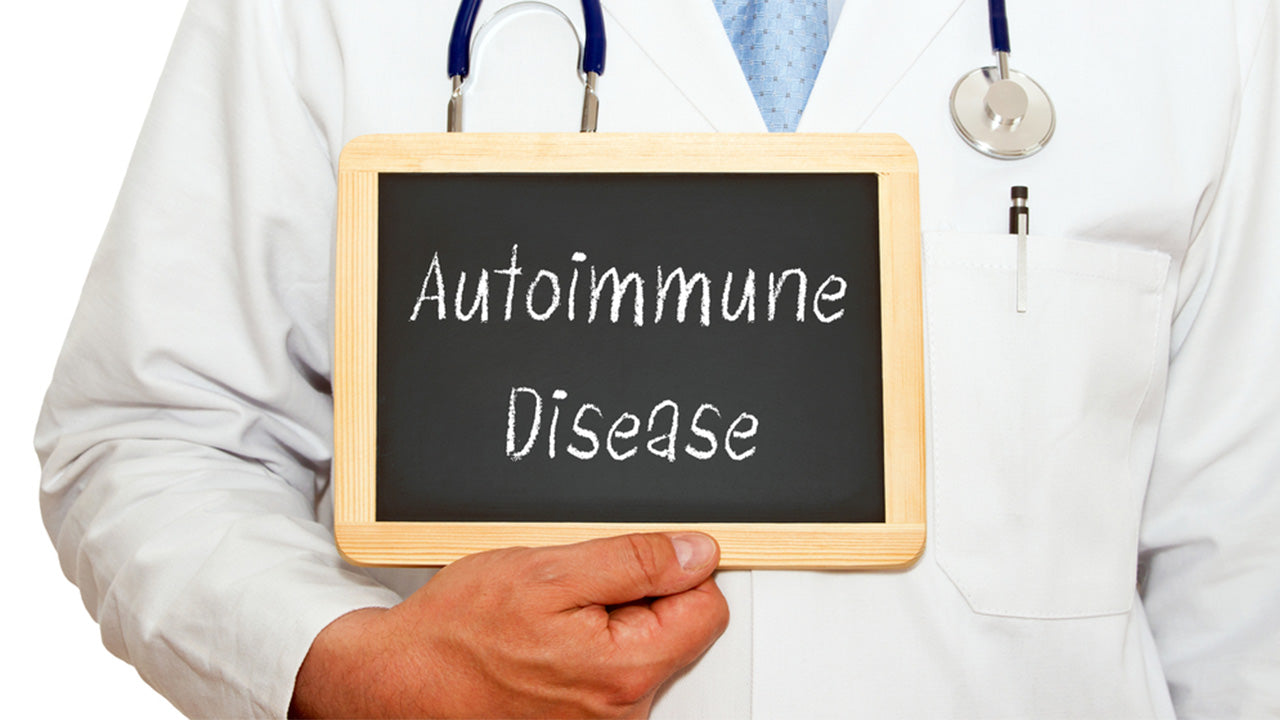Graves’ Disease: Symptoms and Treatment for an Overactive Thyroid
 By: by Amino Science
By: by Amino Science

Graves’ disease is an autoimmune disease in which the body's immune system attacks the thyroid, causing it to produce more thyroid hormone than the body needs. Also known as exophthalmic or toxic diffuse goiter, Graves’ disease is named after Robert Graves, an Irish physician who first described the condition in 1835.
What Causes Graves’ Disease?
The immune system is designed to produce antibodies that protect us from foreign invaders, such as bacteria and viruses. However, it can sometimes become overactive and produce antibodies that treat the body’s own tissues as foreign substances. When this happens, various autoimmune conditions can result.
Under normal circumstances, the thyroid hormone your thyroid produces controls how your body uses energy and is essential for keeping the body healthy and functioning properly.
However, when the immune system attacks the thyroid gland, the overabundance of thyroid hormone throws the body’s many systems into overdrive, creating serious health risks.
According to the American Thyroid Association, approximately 20 million Americans have some type of thyroid disease, while Graves’ disease is known to affect approximately 1% of the population in the United States.
Graves’ disease results from a combination of genetic and environmental factors and is typically seen in women (though men may be affected as well) between the ages of 30 and 50.
Interestingly, Graves’ disease is also more likely to affect people who already suffer from other autoimmune disorders. Conditions associated with Graves’ disease include:
- Systemic lupus erythematosus
- Rheumatoid arthritis
- Pernicious anemia
- Type 1 diabetes
- Celiac disease
- Vitiligo
How Does Graves’ Disease Affect the Thyroid?
The thyroid is a small, butterfly-shaped organ found in the lower front part of the neck. Specifically, it's located just above the collarbone (clavicle) and below the voice box (larynx).
As noted earlier, the thyroid’s job is to produce thyroid hormone, which plays an integral part in energy production for the entire body and affects everything from metabolism to heart rate.
However, the overproduction of thyroid hormone results in overactive thyroid, or hyperthyroidism. And Graves’ disease is the most common cause of hyperthyroidism. Without treatment, Graves’ disease can cause serious health problems, including:
- Graves’ dermopathy
- Irregular heartbeat
- Graves’ ophthalmopathy
- Osteoporosis
- Thyroid storm
Graves’ disease symptoms vary from patient to patient depending on a variety of factors, including how long the disease has been present and how the individual responds to the disruption in thyroid function.
Symptoms commonly associated with this condition include:
| Reddening and thickening of the skin | Menstrual cycle changes |
| Bulging eyes | Anxiety |
| Double vision | Thyroid enlargement |
| Light sensitivity | Hand tremor |
| Weight loss | Heat sensitivity |
| Diarrhea | Shortness of breath |
| Fatigue | Rapid heartbeat |

Diagnosing Graves' Disease
To confirm a diagnosis of Graves’ disease, your health care provider will need to perform a physical exam and speak with you regarding your family history and any symptoms you’ve been experiencing. Your provider will then most likely perform a set of laboratory tests.
According to the American Thyroid Association, blood tests commonly used to confirm a diagnosis of Graves’ disease include:
- Thyroxine (T4)
- Triiodothyronine (T3)
- Thyroid-stimulating hormone (TSH)
- Thyrotropin receptor antibodies (TRAbs)
Typically, with hyperthyroid conditions, T4 and T3 levels are high and TSH levels are low. If hyperthyroidism is detected, your health care provider will next check for antibodies that indicate the presence of Graves’ disease.
However, it can be difficult to diagnose Graves’ disease in the early stages, as it’s often confused with other conditions. For example, patients presenting with multiple symptoms, such as gastrointestinal issues, palpitations, sexual problems, and anxiety, may see a variety of specialists before being referred to an endocrinologist.
Treatment for Graves’ Disease
Graves’ disease treatment will vary depending on the individual and the severity of the disease. Additional factors such as age and underlying medical conditions may affect treatment options as well. However, the following are the most common forms of therapy used in Graves’ disease:
- Beta blockers
- Antithyroid drugs
- Radioactive iodine
- Surgery
Beta Blockers
While beta blockers don’t treat Graves’ disease directly, they do block the effects of excess thyroid hormone on the body. They may also help to quickly relieve symptoms—such as tremors, nervousness, rapid heartbeat, and muscle weakness—while waiting for other treatments to take effect.
Antithyroid Drugs
Antithyroid medications work by blocking the production of new thyroid hormone. These drugs are also typically used in patients with a high likelihood of remission.
While antithyroid drugs do not cure Graves’ hyperthyroidism, the American Thyroid Association reports that treatment using this method results in remission in approximately 20% to 30% of cases.
However, if hyperthyroidism persists for more than 6 months, your health care provider may opt to perform definitive treatment with either radioactive iodine or surgery.
Radioactive Iodine
With radioactive iodine therapy, you’re administered radioactive iodine-131 in either capsule or liquid form. Because the thyroid cells produce thyroid hormone by taking up any form of iodine available in the bloodstream, they readily absorb the radioactive iodine, which then proceeds to destroy the cells.
While unlikely, it’s possible you may need more than one round of treatment, though there may be a waiting period of several weeks to months between treatments to allow the body to flush out any radioactive iodine that was not taken up by the thyroid cells.
Patients who undergo radioactive iodine therapy almost always develop hypothyroidism, a condition in which the thyroid produces too little thyroid hormone—or none at all.
However, hypothyroidism has fewer long-term health effects than hyperthyroidism and can be easily treated with daily thyroid replacement medication.
Surgery
If antithyroid drugs and radioactive iodine fail to reverse Graves' disease, surgery to remove part or all of the thyroid gland is performed.
Antithyroid medications will also be given prior to surgery to bring your thyroid hormone levels into the normal range, as general anesthesia can cause a thyroid storm—a potentially fatal worsening of symptoms.
Patients who undergo surgery as treatment for their Graves' disease will also become hypothyroid and need to be placed on thyroid hormone medication, with monitoring of thyroid hormone levels for life.
Amino Acids
Some Graves’ disease patients may also find that taking amino acid supplements helps improve their symptoms of hyperthyroidism. This is because amino acids are the building blocks of proteins, which are essential for the proper functioning of muscles, organs, and tissues.
Amino acids can help ensure you maintain muscle mass in the face of the weight loss that is a common symptom of Graves’ disease. They may also help restore muscle mass once your Graves’ disease has been treated.
The amino acid L-carnitine is especially noted for its ability to help prevent or treat symptoms of an overactive thyroid, including insomnia, nervousness, palpitations, and tremors.
In addition, studies have shown that supplementation with L-carnitine may help prevent—or even reverse—muscle weakness and may even prevent death from thyroid storm.
Researchers from the University of Maryland Medical System have suggested that L-carnitine may work by blocking thyroid hormone. Since Graves’ disease results from the production of too much thyroid hormone, L-carnitine may have beneficial effects for those with this condition.
However, people with hypothyroidism, or underactive thyroid, should avoid L-carnitine since their levels of thyroid hormone are already too low and L-carnitine may lower them even further.
It should also be noted that there are 20 different amino acids that make up the proteins our bodies need to function. And nine of these—the essential amino acids—must be obtained from either diet or supplementation.
Therefore, to optimize treatment, anyone interested in supplementing with L-carnitine should look for a formula that also provides a balanced mixture of all the essential amino acids.

Vitamins, Minerals, Foods, and Herbs
In addition to amino acids, other natural treatments—including foods—have been shown to support thyroid function and help treat the symptoms of Graves’ disease.
Vitamin D
There’s increasing evidence to suggest that vitamin D deficiency plays a role in thyroid disorders.
In fact, one study demonstrated vitamin D deficiency in 64% of those suffering from Graves’ disease, and another showed that correction of vitamin D deficiency via supplementation was actually able to reverse the onset of Graves’ disease!
Selenium
Selenium is a trace mineral that helps the body make special proteins called antioxidant enzymes. Though needed in only small amounts—hence the term “trace”—selenium is extremely important for both healthy immune function and DNA and thyroid hormone synthesis.
Studies have demonstrated that low levels of this trace mineral are associated with an increased risk of Graves’ disease. In addition, a recent meta-analysis showed that selenium supplementation was effective in restoring a euthyroid state (normal thyroid function).
Cruciferous Vegetables
Cruciferous vegetables, including broccoli, cauliflower, Brussels sprouts, cabbage, and kale, are known as goitrogens—substances that disrupt the production of thyroid hormone by interfering with the uptake of iodine in the thyroid gland.
While eating more cruciferous vegetables certainly won’t cure Graves’ disease, it will help block some of the excess thyroid hormone your thyroid is producing.
Herbs
Various herbs have also been shown to have a calming effect on the thyroid gland. The most well known of these include:
- Bugleweed
- Motherwort
- Lemon balm
Bugleweed contains lithospermic acid and other organic acids, which have been shown to decrease levels of several hormones, particularly TSH and T4. Bugleweed has also been shown to inhibit the binding of antibodies to the thyroid cells.
While motherwort does not work directly on the thyroid, it's been described as a natural beta blocker. This is due to its ability to help calm some of the symptoms of Graves’ disease, including palpitations, anxiety, and insomnia.
Finally, like bugleweed, lemon balm exerts an inhibitory effect on TSH and helps prevent antibodies from attacking the thyroid.
As we've seen, several treatment options are available for people suffering from the effects of Graves’ disease. If you believe you or someone you care about may have the condition, be sure to speak with your health care provider about your symptoms and whether additional support in the form of amino acids, vitamins, minerals, foods, and herbs might help you get back on the road to health.


Up to 25% off Amino
Shop NowTAGS: conditions
Join the Community
Comments (0)
Most Craveable Recipes




 833-264-6620
833-264-6620



















